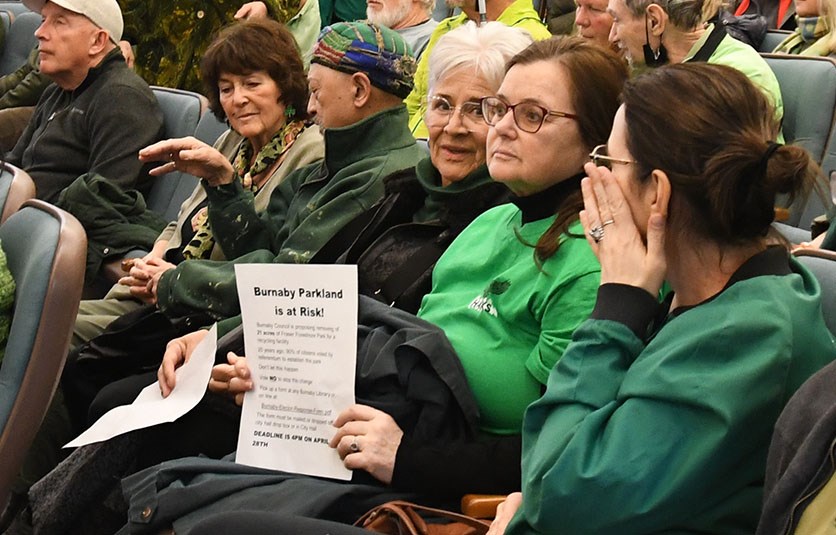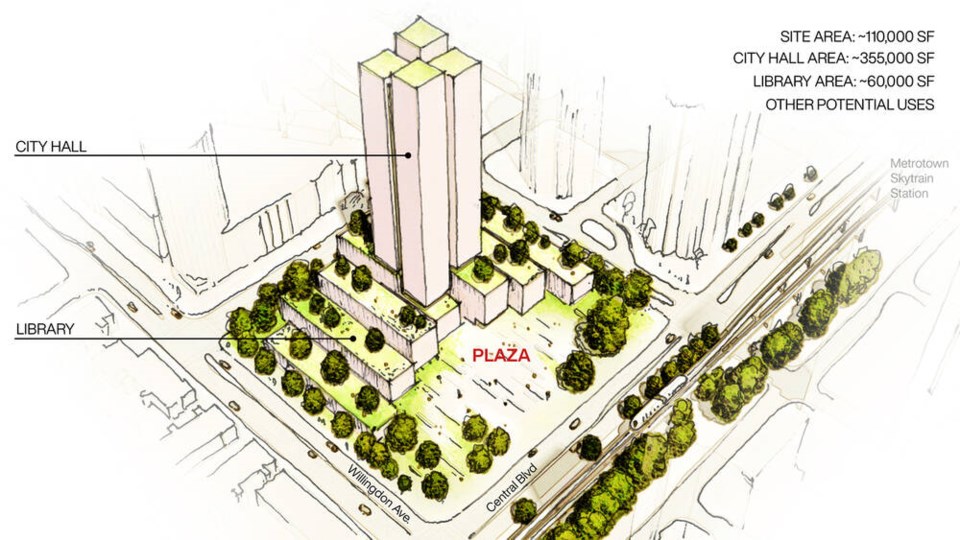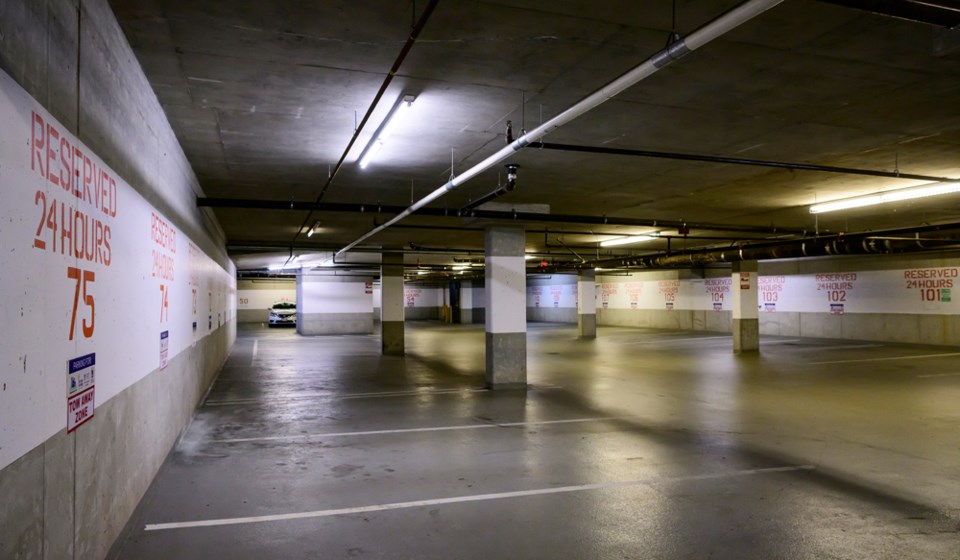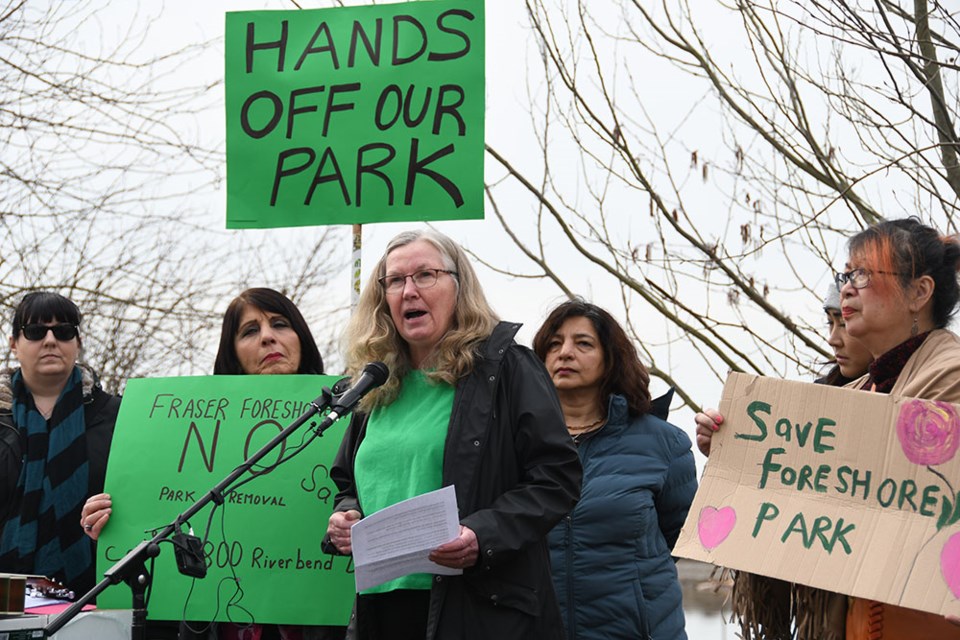Burnaby city council has met with some fierce public opposition this year – and some fierce market conditions.
What were the stories that captured readers this year? How did residents interact with their local political leaders in 2023?
The Burnaby NOW has scoured council agendas and reader letters of the past year and picked four major stories that made an impression at Burnaby City Hall.

1. No GRO: Proposed compost processing facility canned
In February, Burnaby council voted in principle to build a $182-million compost recycling plant on 21 acres of Fraser Foreshore Park.
The city said the compost plant, called GRO, would reduce 14,000 tonnes of carbon emissions annually and earn the city about $1.8 million a year.
The site at Fraser Foreshore is dedicated parkland, meaning residents voted to keep the land as park in perpetuity. For the city to be allowed to build on the site, there needed to be voter approval.
The city then initiated a little-known voting method called the “alternative approvals process,” or AAP, which is designed to test if a matter is “significant” enough to have to go to a referendum.
The AAP required 10 per cent of the city to vote against the project, and not voting would be considered assent.
The public was immediately outraged by the plan and the process and began multiple letter-writing campaigns to both the Burnaby NOW and city council.
Letter writers told the NOW the project would mean a “devastating loss” to the Fraser Foreshore ecosystem and wildlife, which the city itself deemed a “core nature park” of rare habitat.
Burnaby residents were skeptical of the ‘archaic’ AAP voting process, which did not allow email voting and had to be done by mail or in-person.
Opposed residents protested at city hall and at Fraser Foreshore Park.
After public outcry, Mayor Mike Hurley called a special council meeting in March to reconsider the project.
Council spent almost an hour recanting and backtracking on their former support of the project.
The GRO project is now on hold while staff search for another site.
That will be a tough order, as Mayor Mike Hurley said back in February that the Fraser Foreshore Park site was “really the only spot that this (project) can be done, and our staff has done an exhaustive list of properties.”
Since the project was halted, council attempted to ban any future use of the AAP for undedicating parkland, though staff have said it’s not possible due to provincial legislation.
The failed voting process cost the city about $60,000 this year.
One councillor hoped to improve the city’s public communications after the controversy.
Those communications would be quickly put to the test.

2. Metrotown city hall project binned
Nearly two months after the GRO project was cancelled, the city sent out a press release announcing plans to build a new city hall – in Metrotown, not on the current Deer Lake campus.
The project had not been recently discussed in open council.
The mayor said the new city hall would “enhance the civic heart of Burnaby’s true downtown.”
The existing facility at 4949 Canada Way does not meet current building code standards, according to the city, and would cost around $70 million to upgrade.
But the project met with more public opposition.
Residents questioned why city hall needed to move and what would be built at the Deer Lake campus. (The city said public consultation would determine the future of the Deer Lake site.)
The city offered three city-owned Metrotown site options for a new city hall in a consultation period in the summer: Burnaby Public Library and Civic Square, the former Burnaby Firefighter’s Public House or Bonsor Park (a site on dedicated parkland).
Early architectural drawings rendered the new city hall as a highrise office tower.
In September, staff recommended the Metrotown library site – which drew in a flurry of letters to the editor to the NOW.
City hall watchers also expressed shock at a “total project cost” estimate of $852 million for the new city hall.
Coun. Sav Dhaliwal, chair of the financial management committee, told the NOW that number represented a ballpark figure including all the possible amenities the facility could incorporate (such as an art gallery that staff did not recommend including).
Council ended up scrapping the Metrotown city hall idea, citing a “lukewarm response” from the public and concern for the library’s facilities.
Instead, council decided the city hall facility will stay at Deer Lake.
Mayor Hurley said it was “very clear” that most people wanted to keep the facility where it is.
He was also clear that a “30-storey tower” would not be built at the Deer Lake site, rather the facility would be a campus-style.

3. Parking policy stirs the pot at Burnaby council
Councillors went back and forth on a new parking policy this year that would reduce the amount of residential parking developers are required to build.
Councillors and the Burnaby NOW received a number of letters in opposition, as some residents said cutting the number of parking spaces in proposed highrises would only make life harder, while another said not reducing parking is “climate arson.”
Here’s the story in bulletpoints:
'Ridiculous': 14 levels of underground parking in proposed 80-storey Burnaby tower draw concerns
- One of Burnaby’s tallest proposed highrise towers, at 80 storeys tall, currently includes 14 levels of underground parking which raised eyebrows at council. The development is right next to Lougheed SkyTrain station.
- Mayor Mike Hurley said in June he had been waiting for staff “for a long time” to bring forward a new policy to allow the city to move away from “a ridiculous amount of parking.”
Developers push back on Burnaby's proposed $40K parking stall 'penalty'
- In July, the city’s first interim plan was to reduce the minimum required number of parking stalls a development would be required to build within 800 metres of a SkyTrain station
- The policy was opposed by many local developers, who noted the policy would charge them $40,000 per stall not built, which they said would place a “significant financial burden” on development. One developer called it a “penalty.”
14 levels of underground parking in Burnaby won't be reduced – yet
- The first plan was shot down by the city’s planning and development committee, which sent it back to staff for more analysis.
Burnaby council to consider plan for less parking near transit
- In September, staff came back to council with a new plan – one that didn’t include the “penalty” developers had initially opposed.
Burnaby reduces parking minimums in developments near transit
- Council approved the new policy in October
- The policy will reduce the minimum required parking by around 50 to 60 per cent, based on the size and location of a development.
- Coun. Alison Gu suggested further reductions to staff’s plan for how much parking should be built, but Coun. Sav Dhaliwal said that was making new policy on the fly. Gu’s amendment failed in a tie vote, and staff’s proposal was adopted as recommended.
The parking policy will be affected by new housing legislation introduced by the provincial government, which is set to eliminate residential parking minimums near certain rapid transit like SkyTrain stations.

4. Skyrocketing cost of Burnaby’s civic projects
Burnaby is working on a massive capital plan to improve its civic facilities like community centres, pools and arenas.
But since the pandemic, construction costs are soaring and it means the approved budgets are now coming in “significantly” higher than expected.
For example, the C. G. Brown Pool and Burnaby Lake Arena project was originally estimated at $187 million. The project came in at almost $340 million in August. The city had to find cost saving measures, and the revised design will still cost almost $54 million more than originally planned.
The Confederation Park Community Centre, Cameron Community Centre and new RCMP detachment projects have also come in millions higher than initially estimated.
Council also looked into a permanent roof cover to convert a summer pool to an all-year pool to fill the region’s lack of pool space.
Mayor Hurley said the city was surprised by the cost of a permanent roof cover (between $3.8 million and $7.47 million) and council unanimously rejected the plan.
Council voted this December to bring in an external body to advise staff on design and construction costs.
And the Burnaby NOW has gone online-only as we said farewell on Aug. 10 to our weekly print edition.
Sign up here for the NOW's newsletter for curated, local news straight to your inbox daily or once-a-week!



